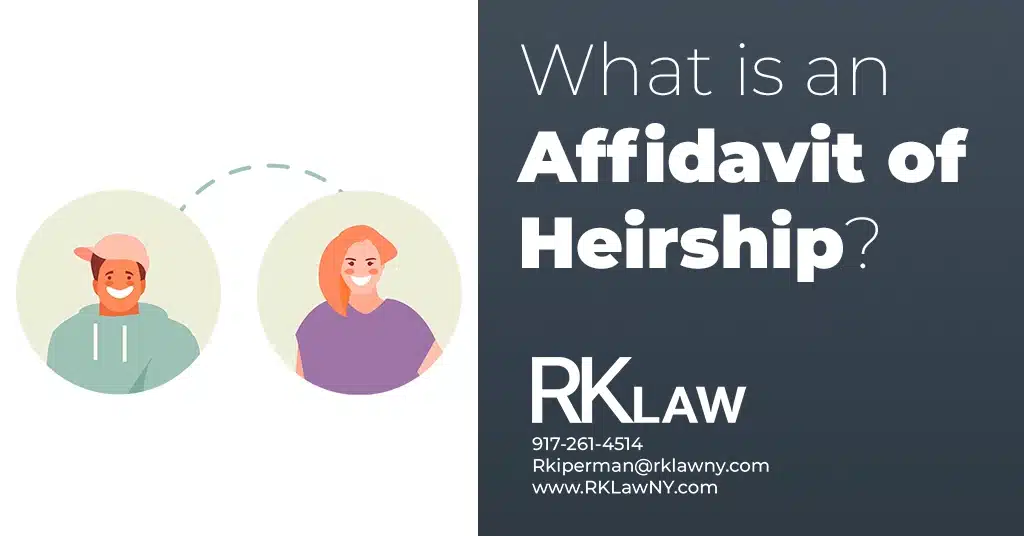An affidavit of heirship is a legal document frequently utilized in the probate process to ascertain the heirs of a deceased individual. The Affidavit of Heirship serves the purpose of providing detailed information about the deceased person’s heirs, their relationships to the decedent, and their respective shares of the estate.
The affidavit of heirship is a document, sworn to under oath, that is submitted to the Surrogate’s Court as part of the petition for Probate or Administration.
Who Can Sign the Affidavit of Heirship?
Pursuant to section 207.16 of the Uniform Rules of the Surrogate’s Court, the Affidavit of Heirship must be signed by a disinterested person. A disinterested person is a person who does not receive a direct pecuniary benefit from the estate. Family members who have something to gain or lose by omitting the name of another possible heir are not considered suitable candidates for signing the affidavit of heirship.
When nobody else is available, a spouse of a distributee has, at times, been considered disinterested. However, rules differ county by county so check with the clerk of the county where you will be filing the petition.
In addition to being disinterested, the person must know the Decedent for at least 10 years and, in some counties, for at least twenty years. Recently, Kings County has been requesting that affidavits be signed by somebody who has known the Decedent for more than twenty years.
Remember, the affidavit must be sworn to and signed before a notary public so getting somebody out of the country to sign the affidavit may be logistically difficult because of the notary requirement.
Is the Affidavit just for Probate or also for Administration?
The affidavit may be necessary in both probate and administration. The affidavit of heirship is necessary in any case where the distributee is either the sole distributee. A distributee is legalese for “next of kin”.
In addition, an affidavit of heirship is also required where the relationship of the decedent to the distributee is siblings or more remote than siblings.
The above paragraphs are chock full of legalese so let’s break it down with some examples:
Example 1:
A and B are brothers. A dies. At the time of his death, A was never married and had no children. A’s parents have also both passed away. B is A’s next of kin. Because B is the only next of kin, B is considered the sole distributee. An affidavit of heirship will be required.
Example 2:
A and B are husband and wife. They have two children. A dies. A is survived by both B and the 2 children. B and the 2 children are all considered distributees of A. However, because A was survived by both a spouse and child, no affidavit of heirship is required.
Example 3:
A is B’s aunt. A dies. At the time of A’s death, A was never married and has no children. In addition, A’s parents have both predeceased A. A’s parents had 5 children (A’s siblings). All 5 children have also died. Some of A’s siblings had children. Those children would be the nieces and nephews of A. Some of those children include B. An affidavit of heirship is required because the relationship of the Decedent to the next of kin is further away than siblings.
If the Will Leaves it All to Friends, then why do Next of Kin Even Matter?
Even though a Last Will and Testament leaves the entire estate to somebody outside of the family, all of the distributees must still be cited or must still sign waivers and consents in order for the Will to be admitted to probate. Because the Court needs to know who all of the distributees are, an affidavit of heirship will still be required.
What about Cousins?
What about them?
In all seriousness, typically when the next of kin are cousins, your affidavit of heirship will need to include both the maternal and paternal sides of the family tree. Many times, when we get to the Cousin’s level, all of the cousins are rarely known and we must show the Court the due diligence that was taken to locate them, a topic for another post, and another day.
We can help you prepare an appropriate affidavit of heirship for your probate or estate administration matter.
For more information, please contact NYC Probate Litigation, Guardianship, NYC Probate and Estate Planning attorney Regina Kiperman:
Phone: 917-261-4514
Fax: 929-556-2089
Email: rkiperman@rklawny.com
Or visit her at:
40 Wall Street
Suite 2508
New York, NY 10005
Visit Regina on LinkedIn
Visit Regina on Facebook
This page is made available by the lawyer for educational purposes only as well as to give you general information and a general understanding of the law, not to provide specific legal advice. By using this site you understand that there is no attorney client relationship between you and the lawyer. The post should not be used as a substitute for competent legal advice from a licensed professional attorney in your state. ATTORNEY ADVERTISING.
